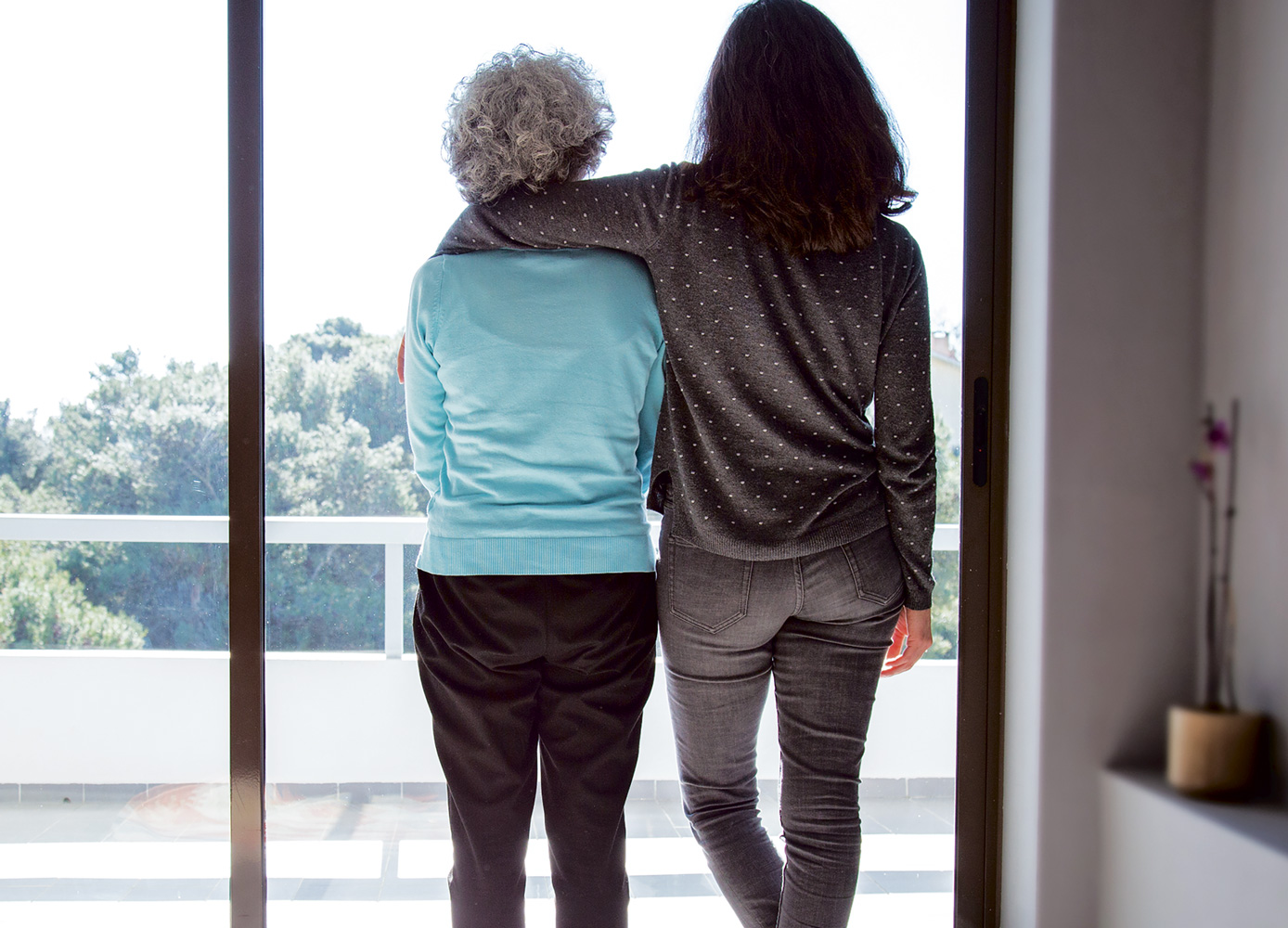By Wendy Haaf
“It didn’t even occur to me for the first three years to ask for help,” Carole Ann Alloway says. Alloway, a co-founder of the support group Family Caregivers Voice, spent five years caring for her husband around the clock after a surgery supposedly requiring just three months of recovery time led to a long series of complications. Even after hitting the wall, instead of reaching out, Alloway kept going, hiding her increasingly frequent crying jags from her husband for fear of making him feel bad. “To me, this was something I needed to do—for better or for worse, in sickness and in health,” she recalls.
Whether we’re going through a bout of illness, are among the one in four Canadians caring for a friend or loved one, or simply feel overwhelmed by a list of must-do tasks that never seems to get shorter, no doubt most of us see something of ourselves in Alloway’s story. Not only does asking for help not come naturally to many people, discomfort at the mere thought of doing so is often enough of a deterrent.
But why is it so hard to ask for help? Are there things we can do to overcome our reluctance to reach out to those around us when we need to? And if we do muster up the will, how can we go about asking in a way that’s most likely to succeed?
Vulnerability
To begin with, there’s our society’s bootstrap mentality and the idealization of individualism. “Those of us over 55 or 60 seem to be of the generation conditioned to do things for ourselves, not to ask for help,” Alloway observes.
“Some of these messages are so deeply ingrained in our own value systems that we start to think of asking for help as a sign of weakness—a sign that we’re not good enough or strong enough or competent enough,” says Euling Chong, a clinical and school psychologist and the clinic director of the Peel Psychology and Therapy Centre in Brampton and Mississauga, ON.
“We have this whole generation of people who were raised to believe that emotions and feelings are something you just put out of your head and plow through,” says Amanda Carver, a psychotherapist who practises in both Toronto and Ottawa. Carver says she’s noticed in her practice that when people 55 or older are feeling overwhelmed by everything life is throwing at them, they often don’t recognize their emotional response as normal. “They feel that they’ve failed,” she says.
That sense of inadequacy and failure can “attack our self-image and our self-esteem,” Chong explains, which in turn “triggers a feeling of shame—that there’s something wrong with us.”
Fear is another common hurdle, according to Chong. “We’re hard-wired to not want to be rejected,” she says, and when we ask for help, “we open ourselves up and become vulnerable to the possibility of rejection.”
There’s evidence that people vastly overestimate the odds of being turned down. For example, in studies in which participants are tasked with asking passersby to assist with a task such as carrying a box to a location that’s out of their way, “people may estimate they’d have to ask eight strangers before somebody would be willing to help them,” says Hilary Bergsieker, an associate professor of psychology at the University of Waterloo (ON), “and it turns out that it’s actually only four strangers.”
Interestingly, people don’t apply such a pessimistic projection across the board. According to research by Vanessa Bohns, a former colleague of Bergsieker’s, “people don’t universally underestimate others’ willingness to help—they specifically don’t think other people are going to help them,” Bergsieker explains. Rejection isn’t the only possible worry. “I find that when people don’t ask for help, it’s because they’re afraid that people are going to say yes when they want to say no,” thereby making the petitioner a burden on the other person, Carver says.
Another societal message many of us absorbed during childhood may cause problems: the notion that caregiving is solely the responsibility of family members, particularly women.
Clearly, there can be a number of obstacles standing in the way of asking for much-needed support. So what can a person do to push those aside?
Interdependence
You can start by examining the assumptions behind your reluctance, since many are likely false.
Take the notion that wanting or needing help means that you’re incompetent or otherwise lacking. Of course this is untrue. “The nature of human beings is to be interdependent—there’s not nearly enough celebration of that,” says Lene Andersen, the author of Chronic Christmas: Surviving the Holidays With a Chronic Illness (Two North Books, 2016), who also blogs about living with rheumatoid arthritis at The Seated View (theseatedview.com). “The reality is that we all need help at some point.” (Andersen’s book is loaded with concrete tips on how friends and family members can offer support during the holiday season.)
In psychological terms, that disconnect between our beliefs and reality “is a cognitive distortion—a thinking error or thinking trap,” Chong says.
Another example is the assumption that we shouldn’t have to ask for help because people should know what we need, and that the absence of an offer indicates they don’t care. You’re likely better at hiding what’s happening inside you than you think, and your friends and family members can’t read your mind.
Loosening these mental restraints “starts with challenging the ridiculous societal myth that you must do it all yourself,” Andersen says. “It doesn’t make any sense.” What’s more, it lays the groundwork for burnout.
As for the idea that someone might grant a request for help despite not wanting to do so, thus causing resentment, “there is some value in the part of you who worries about that, because since we are social creatures, we always have to be monitoring” how others perceive us, Carver says. But instead of chastising the voice in your head, she recommends “recognizing what it’s there for, and not letting it rule your thought processes.” One element of not letting your negative assumptions get away from you is trusting that your friend or family member “has the competence to take care of his or her own boundaries,” she adds.
You can also start chipping away at your misgivings by mentally switching places with a friend or loved one to challenge some of your other cognitive distortions. Ask yourself: If he or she asked for help, what would you do? Most of us would happily oblige. Would you think of that person as weak or inadequate, or would you think it took courage to speak up? And wouldn’t you be upset if he or she were having a hard time but didn’t give you a chance to lend a hand? Then think of how you feel after doing a good deed.
If someone is under strain—say, due to cancer treatment or a flare-up of a chronic illness—“friends and loved ones really want to help, if given the chance,” Andersen observes. Asking for help, then, “is an act of love because you’re giving someone something tangible to do to make your life easier, which is what they want.” Helping someone can make you feel valuable, useful, effective, and just plain good. “So why rob the other person of that opportunity?” Chong asks.
As for the fear that asking for a hand will make the other person like you less, according to social-psychology research, “when people do stuff for us, they actually tend to like us more,” Carver says.
If you still can’t convince yourself, you could consider getting an objective take on your situation from a professional counsellor or seeing someone who’s trained to deliver cognitive behavioural therapy, which can help you break loose of thinking traps.
While you’re working on extricating yourself from your assumptions, you can also take a few preparatory steps that may make it a little easier for you to reach out for assistance.
For starters, identify the people around you who might be willing to pitch in. Having multiple people to turn to can help ensure you’re not always leaning on one person. Carole Ann Alloway suggests trying out the online “Atlas CareMap” tool featured on the caregiver-support website Atlas of Care (atlasofcaregiving.com). “It helps you figure out who your ‘circle of care’ is—who you can rely on,” she explains. At the same time, think about the strengths, abilities, and preferences of each person.
For instance, a friend who loves cooking might be thrilled to drop dinner off one day a week, and your retired-nurse cousin could be more than willing to accompany the person you’re caring for on a doctor’s visit and take notes.
“There’s a certain introspective element to knowing what you need,” Carver says—whether that might be an extra hand and emotional support while you gather up a recently deceased partner’s clothes for donation or a non-judgmental ear while you vent.
Strategies
When you eventually get around to making requests, you can ask someone to choose from your to-do list. This comes in handy when a friend asks how she can help and you don’t have the mental energy to come up with an answer. Not only are you likely to have better luck with specific requests, but a list gives the other person the opportunity to opt for what best suits her.
Once you’ve listed possible sources of support and various tasks that, if removed from your plate, would make your life easier, you can proceed in a few different ways.
One possible strategy “is to have one person, such as an especially close friend, do the awkward part of asking other people to help you on your behalf,” the University of Waterloo’s Hilary Bergsieker suggests. Having someone else organize a schedule can also help ensure you’re getting assistance where and when you need it, instead of “an outpouring all at once and then nothing,” she adds. For instance, you can set up a casserole brigade using the website Meal Train (mealtrain.com), which allows each person who wants to help you view the evening meals in a given week that haven’t yet been volunteered, as well as the dishes slated to be delivered to you on given dates.
Another helpful idea is to make a small convenient-to-grant request. For instance, imagine you know that your neighbour regularly goes grocery shopping on Saturdays—you can then ask if he would mind picking up a few items for you while he’s at the store. “Just practising helps,” Carver says. Mental rehearsal might help, too. “If you go into it imagining the best answer and the worst answer,” she says, you’ll likely realize that, “either way, it’s probably not going to have a big impact on your relationship.”
Regardless, don’t go in assuming that a yes means you’re obliged to reciprocate in kind. You probably help out others with no expectation of payback, “so you need to remind yourself that others may have the same perspective,” Chong says.
You may already be offering the other person support that you don’t even recognize as support. At one time, Lene Andersen recalls, “I struggled a lot because, as someone with a disability, I needed friends and family to help me do practical things, but I couldn’t help them in the same way.” Eventually, however, “I figured out that I’m the person they call at two o’clock in the morning if something goes terribly wrong,” since she’s a great sounding board and a top-tier problem-solver.
Making it clear at the outset that it’s okay to say no takes the pressure off the other person and it helps make you feel that you’re not imposing. If you get turned down, however, it doesn’t necessarily mean the same person will refuse you again. In fact, studies show that when you ask for help from someone who didn’t grant a request the first time, “there’s a higher likelihood the person is going to help you this time,” Chong says.
Finally, you can turn the prospect of helping into something for both you and the giver to look forward to. Andersen suggests talking with your friends and asking if there’s a task that’s been languishing on their to-do lists. Once we no longer have pandemic precautions to worry about, you might make a regular date to get together for a few hours, alternating between your house and the other person’s, to tackle those chores while keeping each other company. You can even celebrate with a nice lunch afterward.
“Setting up reciprocity means you won’t feel guilty, even though that guilt would have been misplaced,” Andersen observes. “You’re also being with the other person and hav- ing a good time together. I think what we forget is that help- ing each other and doing things together is an opportunity to nurture a relationship.” The back-and-forth also allows both parties to reap the known psychological benefits of giving. “It’s not just good for you,” Andersen says. “It’s also a really great way to spend time with people you care about.”
Photo: iStock/MangoStar_Studio.





